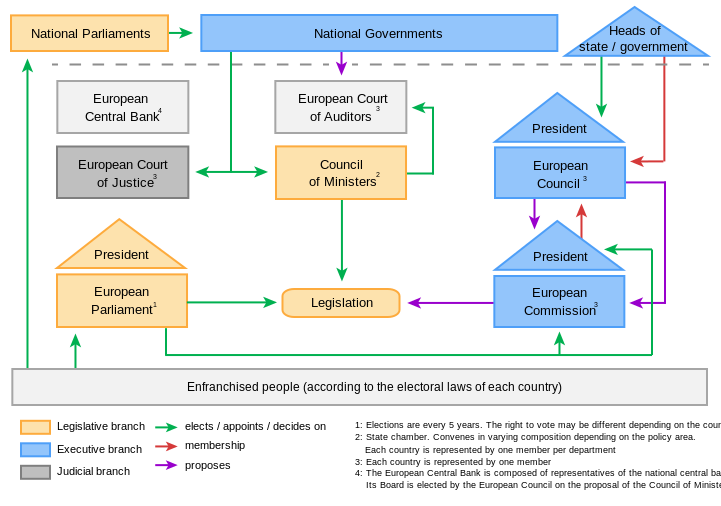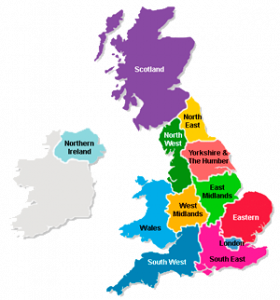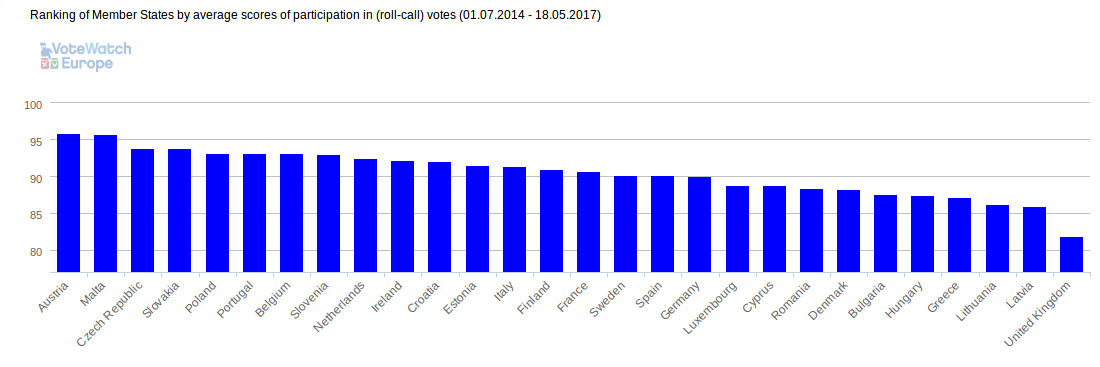It’s undemocratic EU bureaucrats telling us what to do

How many times have we heard this? From tabloid media to politicians, we have heard them all using this as a lazy excuse for our own policy failings. Instead of understanding the real underlying problems and developing policy options to address them, our politicians have for decades simply blamed faceless EU bureaucrats. It’s no wonder so many people have a negative view of the EU. And where have our politicians been in explaining all of the enormous benefits of being in the world’s biggest single market?
There are two parts to this claim: that the EU is undemocratic and that unelected bureaucrats set EU regulations and tell us in the UK what to do. Let’s take a look at these claims.
How does EU regulation come about?

By 111Alleskönner – Own work, CC BY-SA 3.0 de,
https://commons.wikimedia.org/w/index.php?curid=23310690
The European Council
EU regulation does not appear in isolation. The European Council comprised of the heads of state/government of the member states sets EU policy and is the highest political body in the EU. The current president of the European Council is Donald Tusk. So the European Council, with our Prime Minister as one of its 28 members sets the strategic framework in which everything else in the EU operates.
Within this framework citizens of member states can ask for specific new laws to be considered by the EU, through a European Citizens’ Initiative. Where the policy agenda set by the European Council requires new regulation, the European Commission is responsible for developing appropriate draft regulations.
The European Commission
The European Commission is the executive arm of the EU, rather like the Civil Service of the EU. Each member state, including the UK, appoints one of the Commissioners who are responsible for drafting all law of the EU and for proposing new law (bills) in support of the strategy agreed by the European Council. The current UK Commissioner is Julian King, a former UK ambassador to France and politically neutral. All Commissioners are required to be independent of national interests. They are also responsible for day to day running of the EU and upholding its laws and treaties.
The Commission is led by the president (currently Jean-Claude Juncker) who is nominated by the European Council and approved by the European Parliament. The remaining 27 commissioners are nominated by member states, in consultation with the president, and have portfolios assigned by the president. The European Council has to agree the list of nominee commissioners and the European Parliament then interviews and casts its vote upon the commissioners before they can take office.
As an institution, the European Commission relies on the work of about 33,000 officials, staff, and special advisers. Before you jump to the conclusion that this is a huge, unnecessary bureaucracy please remember that the UK has more than 400,000 civil servants, according to 2015 figures from the Office for National Statistics. So the UK, on its own has 12 times the number of civil servants than the whole of the EU.
So the European Council (including the UK Prime Minister) sets the strategic direction for the EU. Any required regulation to support that strategy, or requested by EU citizens, is drafted by the European Commission (the EU Civil Service, including one Commissioner nominated by the UK). Then what? All proposed regulation is reviewed by both the European Parliament and the Council of Ministers and can be amended by both before it is either adopted or rejected (11).
European Parliament
The European Parliament has 751 members directly elected by EU voters every 5 years by proportional representation and representing nearly 500 million citizens. It is the only directly elected body in the EU and shares budgetary and legislative authority with the Council of the European Union (Council of Ministers). The UK has 73 elected MEPs (7) with the next election in 2019. The UK is divided into 12 electoral regions, each region has between 3 and

10 MEPs and each MEP in a region represents every person living there.
In the last European election in 2014 UKIP came out top with 24 MEPS, Labour second with 20 seats, Conservatives third with 19 seats, Greens 3, SNP 2, Lib Dems 1, others 4 (8).
Council of the European Union (The Council/Council of Ministers)
The Council of the European Union (often called the Council of Ministers) is composed of 28 national ministers (one per state). The ministers attending vary depending on the topic being discussed. The 28 ministers represent their governments and are accountable to their national political systems. It is the main decision making body of the EU holding legislative and limited executive powers. It’s presidency rotates every 6 months (with every 3 presidencies cooperating on a common programme). Votes are taken by majority or unanimity with votes allocated according to population. They share legislative and budgetary power with the European Parliament and lead on common foreign and security policy.
This is separate from the European Council.
Working together these institutions ensure that EU regulation only exists within a strategic framework agreed in the European Council (including the UK Prime Minister), is drafted by a professional civil service (the European Commission, including a nominated UK Commissioner), is debated, amended and agreed or rejected by the directly elected European Parliament including 73 directly elected UK MEPs, and debated, amended and agreed or rejected by the Council of Ministers (including the appropriate UK minister or prime minister). National parliaments also now have the power to consider and to challenge any EU laws that they think should be made at a national rather than an EU level (13).
This does not sound like faceless bureaucrats telling us what to do!
There are also two supporting institutions that exist to ensure fair play between member states and that tax payers money is being well spent.
Court of Justice of the European Union
The Court of Justice of the European Union, located in Luxembourg, is responsible for Ensuring EU law is interpreted and applied the same in every EU country; ensuring countries and EU institutions abide by EU law. It includes one judge from every EU country.
It is NOT the same as The European Court of Human Rights and is NOT responsible for adherence to the European Convention on Human Rights.
Court of Auditors
The European Court of Auditors is an independent institution established to ensure that taxpayer funds from the budget of the European Union have been correctly spent and provide audit reports to the Council and Parliament. The Parliament uses this to decide whether to approve the Commission’s handling of the budget. The Court also gives opinions and proposals on financial legislation and anti-fraud actions. It is composed of one member from each member state appointed by the Council every six years.
There is also a European Central Bank that is the central bank for the eurozone. The UK is outside the eurozone.
So how democratic is it?
There are many ways in which the EU is truly democratic and may be more democratic than the UK. Here in the UK we have an unelected upper chamber (the House of Lords) unlike many countries where the upper chamber is directly elected, and we are not able to directly elect the prime minister, unlike countries where the head of state/president is elected by citizens independently of the ruling party (e.g. the USA and France).
That’s not to say the EU is perfect! Clearly, no democracy could claim perfection, so in what ways could EU democracy be improved?
- The EU can be seen as too distant from its citizens and too complicated for the citizens to be sufficiently involved in its decision making. There are actually some very good attempts at addressing this (e.g. 11) but no doubt the EU needs to continually work at improving the way it communicates with citizens through better education, information sharing, engagement, and transparency.
- Elections for the European Parliament suffer from a low turnout. In the UK only 35.6% of people voted in the 2014 EU election, so many citizens are not accepting the opportunity (responsibility?) to influence EU decision making. Those who do vote tend to vote more on the basis of their opinions on national issues rather than European issues,. It should be noted that turnout in UK elections generally is a problem not restricted to EU elections. In the 2017 Mayoral elections turnout was as low as 21% (Tees Valley) and the first Police and Crime Commissioner elections in 2012 had a turnout of only 14.9% (14). This is something that should concern everyone.
- The European Commission is an entirely appointed institution, not directly democratically elected and, some would argue, is too powerful. However, the Commission can only propose EU laws in areas where the UK government and the House of Commons has allowed it to do so. A Commission proposal only becomes law if it is approved by both a qualified-majority in the EU Council (unanimity in many sensitive areas) and a simple majority in the European Parliament. In practice this means that after the amendments adopted by the governments and the MEPs, the legislation usually looks very different to what the Commission originally proposed. In many ways, the way the Commission is chosen is similar to the way the UK government is formed. Neither the British Prime Minister nor the British cabinet are ‘directly elected’. We cannot vote on the choice for the Prime Minister, but rather vote for individual MPs from different parties. Then, by convention, the Queen chooses the leader of the largest party in the House of Commons to form a government. This is rather like the European Council choosing the candidate of the political group with the most seats in the European Parliament to become the Commission President. Then, after the Prime Minister is chosen, he or she is free to choose his or her cabinet ministers. There are no hearings of individual ministerial nominees before committees of the House of Commons, and there is no formal investiture vote in the government as a whole. From this perspective, the Commissioners and the Commission are more scrutinised and more accountable than British cabinet ministers. (3)
You get what you wish for
There is a detailed and complex debate to be had about any potential democratic deficit in the EU and how it might be improved (4, 5 and 6). Indeed it would be childish over simplification to think democracy could not be improved in the EU, and in the UK or any other existing democracy. There is also a real debate to be had about what level of democracy is appropriate for the EU, given it is not a state, and neither is it like any other international organisation such as the UN, NATO, WTO, IMF, World Bank, etc.
However, a strong argument can be made that the EU is at least as democratic as the UK: the UK having a monarch and a partly-hereditary House of Lords would strike some as ‘un-democratic’ in comparison to an elected head of state or upper chamber.
It is also clear that the EU is not able to simply impose its wishes on us in the UK without our consent – we have great power through our MEPs and Commissioners to stop anything we don’t like.
In the last European election in 2014 (8) UKIP came out top with 24 MEPS, Labour second with 20 seats, Conservatives third with 19 seats, Greens 3, SNP 2, Lib Dems 1, and others 4.
UKIP was founded in 1993 to campaign for the UK’s withdrawal from the EU (9).
With 24 MEPs out of 73 for the whole of the UK UKIP is the largest group of UK MEPs. So we used our democratic power to elect to represent us in the EU 24 MEPs whose sole policy aim is the destruction of the vary institution we have elected them to. They have, not surprisingly, failed totally in representing UK interests. UKIP MEPs attended the fewest European Parliament votes of any party in the EU’s 28 countries (10). Oh, and the UK as a whole has the worst rates of participation in votes of MEPs of all member states (10). So instead of complaining about the EU and it’s democracy why don’t we elect MEPs who want to actively work to make things better instead of MEPs whose sole purpose is to destroy the EU.

If you still believe that the EU is run by unelected bureaucrats ask yourself the following questions:
- did I vote in the last European elections?
- do I know who my MEP is? (If not, find out here: http://www.europarl.europa.eu/unitedkingdom/en/your-meps/uk_meps.html )
- do I know what the main institutions of the EU are and how they operate? (If not, see (11)).
References
(1) The institutions of the EU: http://en.strasbourg-europe.eu/detailed-explanations-about-the-institutions-of-the-european-union,3214,en.html
(2) CIVITAS: http://www.civitas.org.uk/content/files/CIT5.-Dem.pdf
(3) Democratic Audit UK (Democratic Audit is an independent research unit based at the Public Policy Group in the LSE’s Government Department) http://www.democraticaudit.com/2016/06/23/is-the-eu-really-run-by-unelected-bureaucrats/
(4) Follesdal, A. and Hix, S. (2006). Why there is a democratic deficit in the EU: A response to Majone and Moravcsik. JCMS: Journal of Common Market Studies, 44(3), pp.533–562.
(5) Majone, Giandomenico. 2000. The Credibility Crisis of Community Regulation, Journal of Common Market Studies 38 (2): 273-302.
(6) Moravcsik, Andrew. 2002. In Defense of the ‘Democratic Deficit’: Reassessing the Legitimacy of the European Union, Journal of Common Market Studies 40 (4): 603-634.
(7) UK MEPs: http://www.europarl.europa.eu/unitedkingdom/en/your-meps/uk_meps.html
(8) European Parliament election 2014: https://en.wikipedia.org/wiki/European_Parliament_election,_2014_(United_Kingdom)
(9) UKIP web site: http://www.ukip.org/about
(10) Vote Watch Europe: http://www.votewatch.eu/en/term8-member-states-attendance.html
(11) EU ordinary legislative procedure:
http://www.europarl.europa.eu/external/html/legislativeprocedure/default_en.htm
(12) Institutions of the EU: https://europa.eu/european-union/about-eu/institutions-bodies_en
(13) CIVITAS – Democracy in the EU: http://www.civitas.org.uk/eu-facts/eu-overview/democracy-in-the-eu/
(14) Mayoral Elections 2017 : http://www.bbc.co.uk/news/election-2017-39817224


Here’s a really useful resource for debunking all those EU myths…
http://blogs.ec.europa.eu/ECintheUK/euromyths-a-z-index/